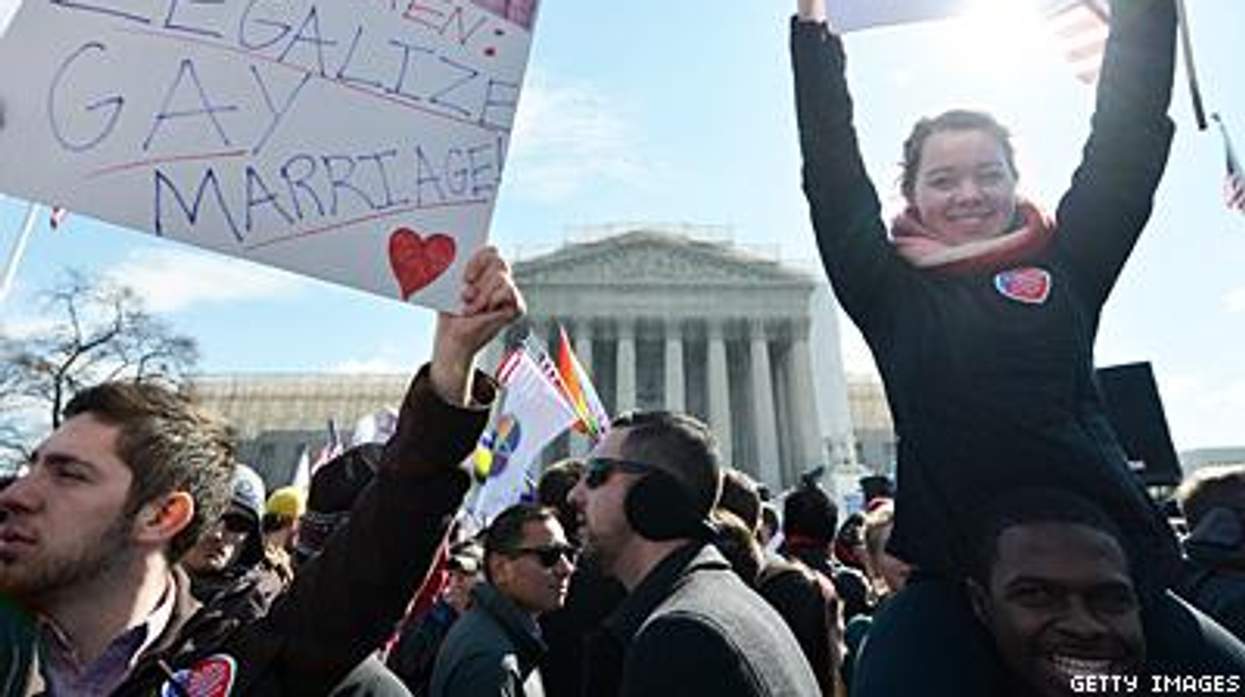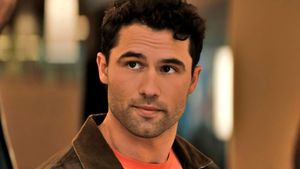WASHINGTON, D.C. -- Lawyers for Edie Windsor in her challenge to the Defense of Marriage Act struck an optimistic tone after today's hearing before the Supreme Court. Here's a look at some of the most important moments as they happened in the courtroom.
Biggest takeaway: The court did not have nearly as many questions about the equality arguments today as they did Tuesday. At some points during the period in which Edie Windsor's lawyer Roberta Kaplan presented arguments about the injustice of DOMA, there were almost unusual pockets of silence. Justices Ginsburg, Kennedy, and Sotomayor all made some profound statements related to inequality, but it wasn't a major point of inquiry -- almost as if the justices understood those arguments and many, perhaps, seemed to accept that DOMA treats same-sex couples unfairly. They focused much more energy on whether the court has the jurisdiction to issue a ruling in this case. The bad news is, if the justices decide they do not have jurisdiction, they won't even get to the question of whether DOMA is unconstitutional. The silver lining is, the federal district court ruling would stand. Following the hearing, Kaplan said she feels "confident" the court will resolve "the merits of this case" (i.e. the constitutionality of DOMA) and, at the very least, that "Edie gets her money back." As in $363,000. That result seems like a decent bet at this point, whether the court rules on the constitutionality of DOMA or simply decides it doesn't have jurisdiction to rule.
Most stunning: The lawyer for the Bipartisan Legal Advisory Group, or BLAG, seemed to rewrite the history of why DOMA was passed. As the American Civil Liberties Union's Anthony Romero told me, "I think the outright lying of Paul Clement about the animus that was motivating DOMA was startling." Clement argued that DOMA passed because the federal government was trying to effect uniformity in how it treated same-sex couples while the states experimented with different types of unions. Romero said it went beyond "spinning" the facts. Romero: "For an attorney to stand up in front of the court and say that animus was not a part of the picture in 1996 when Congress enacted DOMA is dishonest ... it was rather breathtaking."
Biggest dig: If Chief Justice John Roberts still has a bit of a chip on his shoulder from when President Obama frowned on the court's Citizens United opinion during his 2010 State of the Union address, Roberts returned the favor today. During a discussion about whether the court has the jurisdiction to rule in this case, the justices wondered why the executive branch had decided to stop defending the law yet continued to enforce it but then appealed the lower court's ruling that DOMA was unconstitutional -- a contention with which the executive branch agreed -- to the Supreme Court. (Head spinning yet?) Government lawyers eventually said the federal government had continued enforcing the law but sought guidance from the Supreme Court out of respect for the judiciary's authority to decide what the law is. But Roberts, sounding a touch exasperated, said of President Obama, "I don't see why he doesn't have the courage of his convictions ... rather than saying, oh, we'll wait till the Supreme Court tells us we have no choice." Overall, the conservative justices seemed very engaged with this general line of inquiry, and if the court decides it does not have the jurisdiction to rule in this case, one could imagine this being a trouble spot. As Columbia University law professor Suzanne Goldberg observed, "I was struck by the number of questions that were concerned with 'opening the floodgates' on cases where the government agrees with the party on the other side of the case."
Best exchanges: Justices Kennedy, Kagan, and Ginsburg appeared to find Clement's contention that DOMA was all about uniformity very suspect. At one point, Kennedy ascertained Clement to be saying that Congress intended to help the states by letting them experiment with same-sex unions but then observed that it actually cut the legs out from under them once they decided to legalize marriage. In other words, Kennedy said, "We're helping the states ... if they do what we want them to." Ginsburg called DOMA "pervasive" and said it affected "every area of life." Based on DOMA, she said, there are two kinds of marriage: "full marriage, and then this sort of skim milk marriage." And Kagan finally put the nail in the coffin when she quoted from the 1996 Congressional record: "Well, is what happened in 1996 -- and I'm going to quote from the House Report here -- is that 'Congress decided to reflect an honor of collective moral judgment and to express moral disapproval of homosexuality.' Is that what happened in 1996?"
The final word: In two days of arguments, the antigay camps in both cases completely ducked the question: Why discriminate against LGBT people? As Freedom to Marry's Evan Wolfson said following Wednesday's arguments: "The single most striking thing was that both opposing counsels could not offer a single specific reason for why gay people -- let alone gay couples -- should be treated unequally under the law." Instead, they took refuge in process arguments and told the court they should let this experiment play out in the states. By contrast, Wolfson notes, "We put forward a who's who of America talking about all the reasons for ending this discrimination." Wolfson's point was evident in nearly everything surrounding the proceedings: the size of the crowds outside, how enthusiastically our attorneys stood at the microphones to take questions following the cases, the indelible images of Edie Windsor blowing kisses in her pink scarf and the twin sons of Sandy Stier and Kristin Perry declaring, "We love our family and we look forward to the day when we will be treated equally under the law." These two cases may not have an immediate sweeping effect legally if the justices get bogged down in issues of standing and jurisdiction, but the tidal wave of change that's approaching is not just visible, it's palpable. And it's awesome.




































































Charlie Kirk DID say stoning gay people was the 'perfect law' — and these other heinous quotes